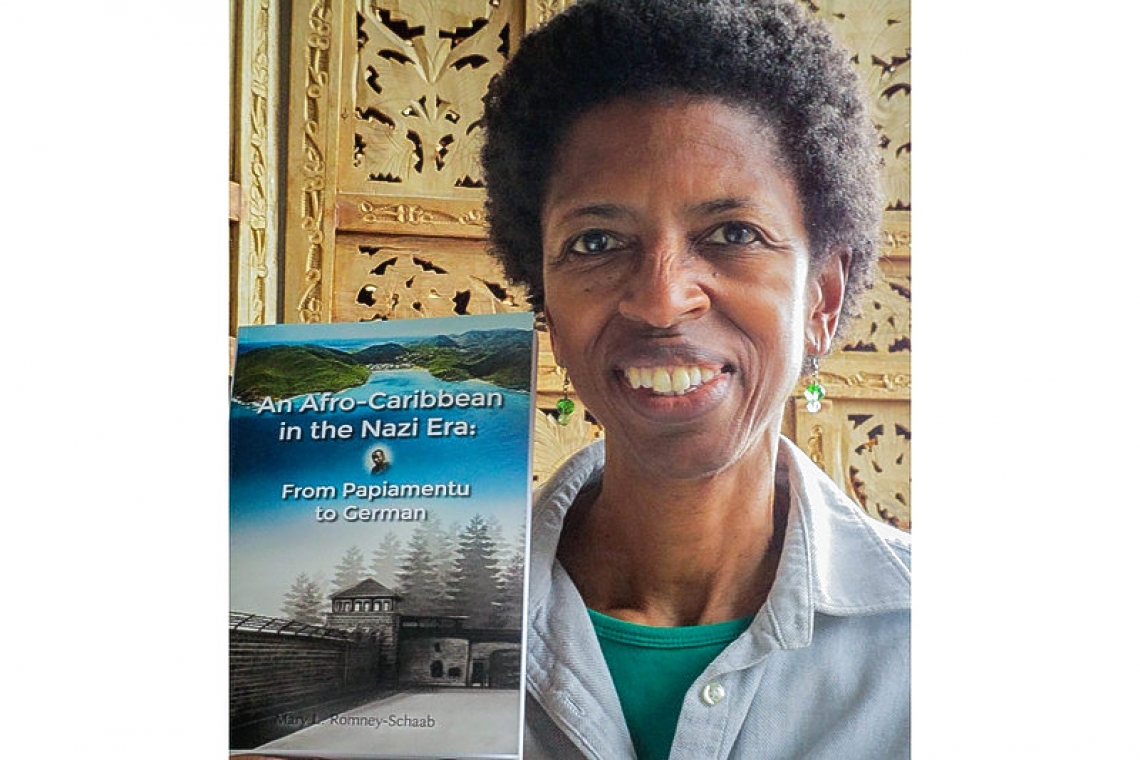Photo: Author Mary Romney-Schaab with her book, An Afro-Caribbean in the Nazi Era.
By Mark Yokoyama
Mary L. Romney-Schaab is the author of An Afro-Caribbean in the Nazi Era: From Papiamentu to German. It is the true story of her father, Lionel Romney, of St. Martin, including his time imprisoned in a Nazi concentration camp. In an interview, she discussed her interest in history and the process of recording her father’s oral history. The following is an excerpt from her interview.
What made you interested in recording your father's history?
Since I was a child, I’ve known – emotionally, intuitively, or implicitly – the importance of history. But it was only as a mature adult that I began to think about the individual person’s relationship to, and role in, history. I think that what delivered me to that understanding were my visits to St. Martin with my father. During those visits, I was always fascinated by the reminiscences of my father and his contemporaries in the family and the community, such as Emilio Wilson. The memories they shared with each other about life in the first two or three decades of the 20th century in St. Martin were more entertaining than movies or TV!
So I began diving for books on the history of St. Martin to provide myself with some context, but came up practically empty. It was at that point that I realized that I’d been witnessing the history of St. Martin right there in the memories of the elderly – my father’s contemporaries.
As we began to lose people in my father’s generation, I realized the need to record their memories. That’s how I got the idea of doing oral histories with both of my parents. My original intention was accessing some personal history, family history, and St. Martin history.
The biggest challenge was getting my father to talk about his World War II experiences. After over 20 years of trying, I believed that he would probably not talk about it. He was in the typical silent period for people who have suffered from trauma. It’s actually a symptom of post-traumatic stress disorder. He was suffering from that, although I didn’t realize it until years after he’d passed away.
How did you realize you were researching such a unique story?
Perhaps the uniqueness of my father’s story first occurred to me because of my own deep shock at finding out that he’d been in a concentration camp. But beyond how I felt emotionally, I realized it was unique because it didn’t comply with anything I’d ever known or been taught about the Nazi era. Plus, in my first oral history interview with him, my father said that one of the reasons why he didn’t talk about it for so long was because he didn’t think anyone would believe him. He himself must have known how unusual his story was.
How did this process change your relationship with your father?
As a result of recording his oral history and writing the book, I understand him better now than I ever did before. The oral history interviews really allowed me to access the areas of his life that had previously been inaccessible to me. I knew they were there, but I couldn’t unearth them. So when he finally began to talk about them, it was like finding buried treasure. Through the oral history interviews, I was able to be closer to him in ways I never had before, because he was taking me on a journey through his memories.
Do you have a family story you would like to research? Let us know by writing in to This email address is being protected from spambots. You need JavaScript enabled to view it. or The Daily Herald. We will also be sharing more of Mary Romney-Schaab’s interview next week.







